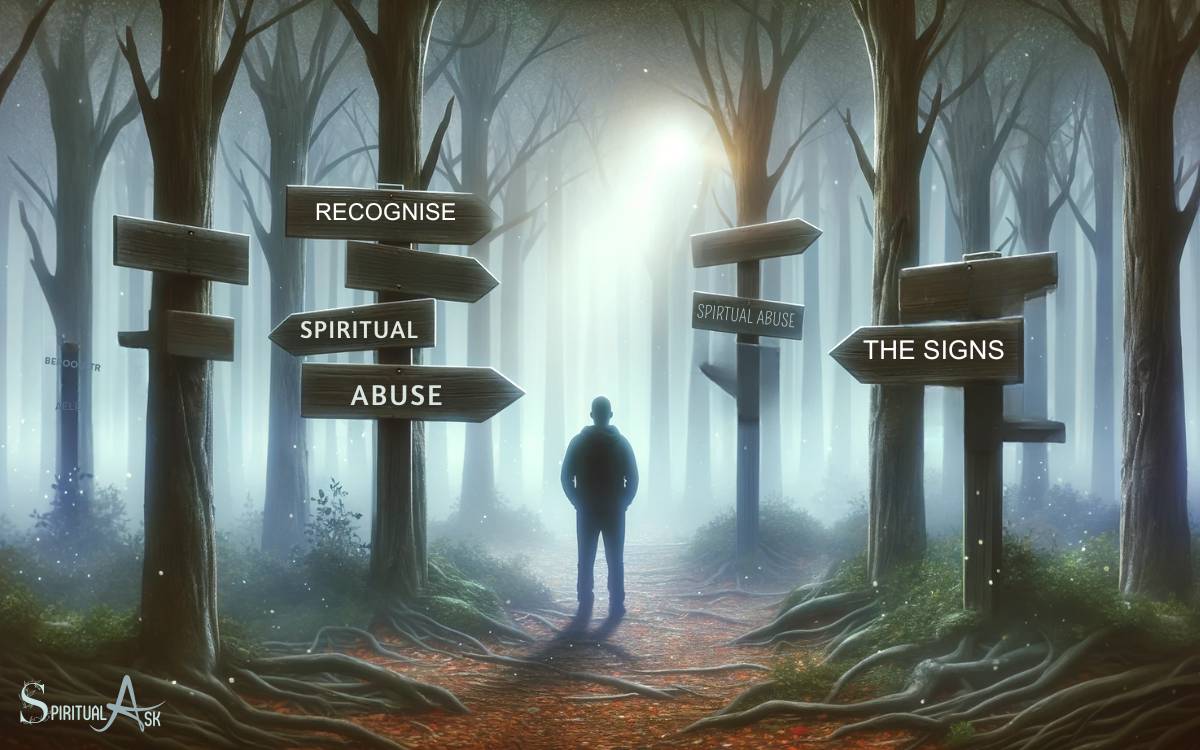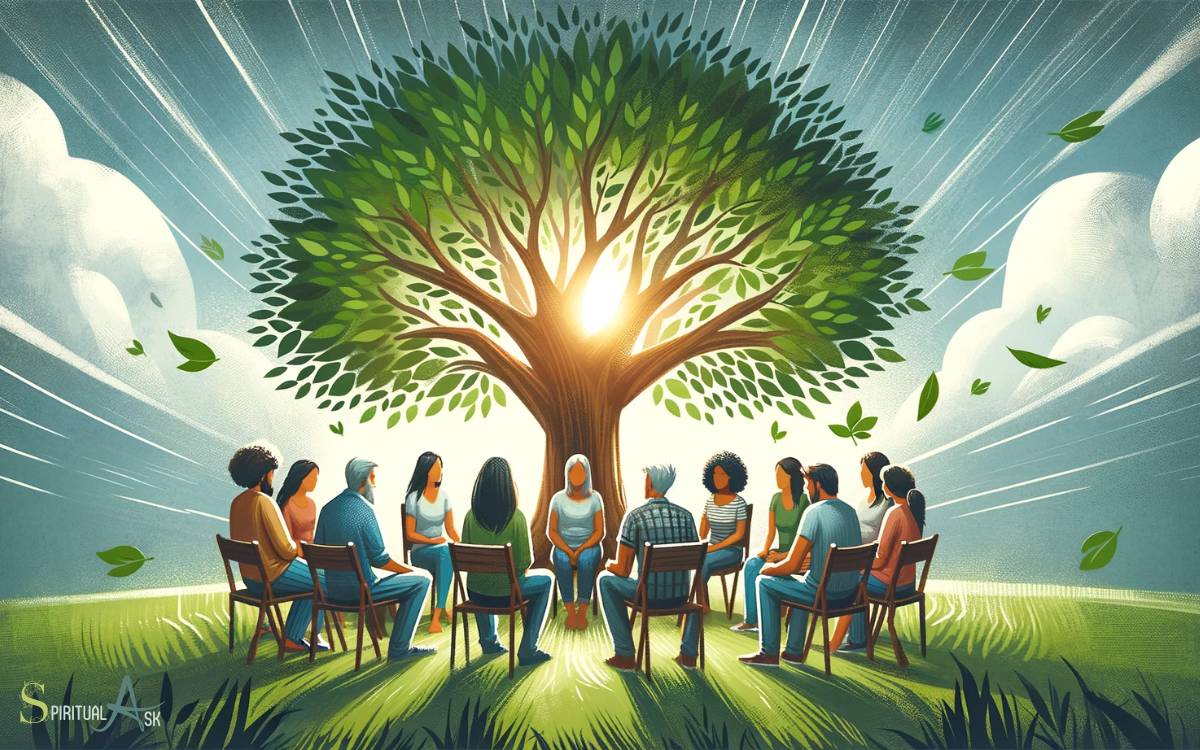How to Heal from Spiritual Abuse? Recovery!
Recovering from spiritual abuse involves a holistic approach that addresses emotional, psychological, and spiritual needs.
It requires acknowledging the harm done, understanding the dynamics of abuse, and actively participating in self-care and therapeutic processes to restore wellbeing.
Spiritual abuse can take many forms, but it generally involves a misuse of authority within a spiritual context, leading to manipulation and harm.
Recovery includes several key steps:
Embark on a journey of healing with steps tailored to overcome the shadows of spiritual abuse and reclaim your sense of self.

Key Takeaway
5 Steps to Healing from Spiritual Abuse
| Step | Description | Why It’s Important |
|---|---|---|
| Acknowledge Abuse | Recognize and accept that the abuse occurred. | Validates the victim’s experience and begins the healing process. |
| Set Boundaries | Establish limits to interactions with abusers or triggering environments. | Protects from further harm and empowers the individual. |
| Seek Professional Support | Consult with therapists or support groups experienced in spiritual abuse. | Provides expert guidance and a supportive community for healing. |
| Rebuild Trust | Take small steps to restore trust in oneself and others. | Essential for building healthy relationships and self-esteem. |
| Embrace Personal Growth | Pursue activities that promote self-care and spiritual well-being. | Fosters resilience and a positive identity post-abuse. |
Recognizing the Signs of Spiritual Abuse
As a survivor of spiritual abuse, I recognize the signs that often go unnoticed by others. It’s not always easy to identify, especially when the abuse is disguised as religious or spiritual guidance.

The first red flag is often excessive control and manipulation in the name of faith. This can manifest as pressure to conform, isolation from loved ones, or even threats of divine retribution for disobedience.
Another sign is the misuse of scripture or spiritual teachings to justify abusive behavior, creating a twisted sense of righteousness.
Additionally, emotional and psychological manipulation, such as inducing fear or shame, is a common tactic.
These signs can be subtle and easily dismissed, but for those who have experienced spiritual abuse, recognizing these warning signals is crucial in the journey to healing.
Establishing Boundaries and Self-Care
Upon recognizing the signs of spiritual abuse, I found it imperative to establish clear boundaries and prioritize self-care in my journey toward healing.

Setting boundaries meant learning to say no without guilt, identifying what is acceptable treatment, and communicating my needs assertively.
This involved distancing myself from toxic environments and individuals, and surrounding myself with supportive and understanding people.
Self-care became a non-negotiable priority, involving activities that nourished my mind, body, and spirit. I learned to listen to my emotions, seeking therapy and support groups to aid in processing the trauma.
Engaging in activities that brought me joy and practicing mindfulness also became essential in rebuilding my sense of self-worth and inner peace.
Establishing boundaries and prioritizing self-care has been pivotal in my healing process, allowing me to reclaim my autonomy and well-being.
Seeking Professional Support and Counseling
When should I consider seeking professional support and counseling to heal from spiritual abuse? It’s important to seek professional help if you find yourself struggling to cope with the aftermath of spiritual abuse.

A trained counselor or therapist can provide a safe and supportive environment for you to process your experiences, work through any trauma, and develop healthy coping mechanisms.
They can also help you navigate the complex emotions and spiritual conflicts that may arise during the healing process.
Professional support can offer valuable insight and guidance as you work towards reclaiming your sense of self and rebuilding a positive relationship with spirituality.
Rebuilding Trust and Reconnecting With Spirituality
After seeking professional support and counseling to heal from spiritual abuse, I found that rebuilding trust and reconnecting with spirituality was a crucial part of my journey towards recovery.

Rebuilding trust involved finding safe and supportive communities where I could explore my spirituality without fear of judgment or manipulation. It also meant learning to trust my own intuition and inner wisdom again.
Reconnecting with spirituality was a gradual process that involved revisiting practices and beliefs that felt authentic to me, rather than those imposed by the abuser.
I sought out teachings and resources from diverse spiritual traditions, allowing myself to explore and find what resonated with me personally.
Through this journey, I learned to reclaim my spirituality on my own terms and rebuild a sense of trust in both myself and the spiritual aspects of life.
Finding Healing Through Community and Support Groups
I’ve found that surrounding myself with a supportive community has been crucial in my healing journey. It’s through these connections that I’ve been able to rebuild trust and feel safe in sharing my experiences.
Being part of a support group has provided me with a sense of belonging and understanding that has been instrumental in my healing process.

Importance of Support Networks
Finding healing through a supportive community and joining a support group is essential for recovery from spiritual abuse.
Support networks provide a safe space to share experiences, receive empathy, and gain strength from others who have walked a similar path.
These support networks play a crucial role in the healing journey, offering validation, understanding, and practical assistance.
By connecting with others who have faced similar challenges, individuals can find the encouragement and strength needed to embark on a path towards recovery.
Building Trust in Community
Navigating through the aftermath of spiritual abuse, I found solace in a supportive community and came to rely on the understanding and empathy of others who have walked a similar path.
This journey of healing has taught me the importance of building trust in community and finding healing through support groups.
Here are a few key aspects to consider:
- Shared Understanding: Connecting with individuals who have experienced spiritual abuse can provide a sense of validation and understanding that is crucial for healing.
- Empathetic Support: Building trust in a community entails receiving empathetic support, where individuals can freely express their emotions without judgment.
- Safety and Boundaries: A healing community should prioritize creating a safe space with healthy boundaries, fostering an environment of trust and respect.
These elements have been instrumental in my own healing process, and I hope they can provide guidance for others seeking to rebuild trust within a supportive community.
Sharing Experiences for Healing
Amidst the journey of healing from spiritual abuse, I leaned on the strength of others within a supportive community, finding solace in sharing experiences and connecting with empathetic support groups.
Being able to speak openly about my struggles and listen to others’ stories provided a sense of validation and understanding that was crucial for my healing process.
It was through these interactions that I realized I was not alone in my experiences, and this shared understanding brought a profound sense of comfort and reassurance.
Additionally, the support groups offered practical guidance and coping mechanisms that helped me navigate the complexities of healing.
These connections became a vital part of my recovery journey, reminding me that healing is possible and empowering me to take positive steps forward.
Embracing Personal Growth and Empowerment

During my journey of healing from spiritual abuse, I have discovered the importance of actively pursuing personal growth and empowerment. It’s a process of reclaiming my sense of self-worth and autonomy, and it has been crucial in my healing journey.
Embracing personal growth and empowerment involves:
- Self-reflection: Taking the time to understand my thoughts, feelings, and behaviors, and how they have been influenced by past experiences.
- Setting boundaries: Learning to establish and maintain healthy boundaries in relationships, and recognizing that it’s okay to prioritize my well-being.
- Seeking support: Surrounding myself with people who uplift and encourage me, whether it’s through therapy, support groups, or trusted friends and family.
These steps have been instrumental in helping me regain a sense of control and agency in my life.
Conclusion
As I continue on my journey of healing from spiritual abuse, I’ve learned the importance of recognizing the signs, setting boundaries, and seeking support.
It’s amazing how, as I’ve worked on rebuilding trust and reconnecting with my spirituality, I’ve found healing through community and support groups.
Embracing personal growth and empowerment has been key in my healing process, and I’m grateful for the progress I’ve made.






